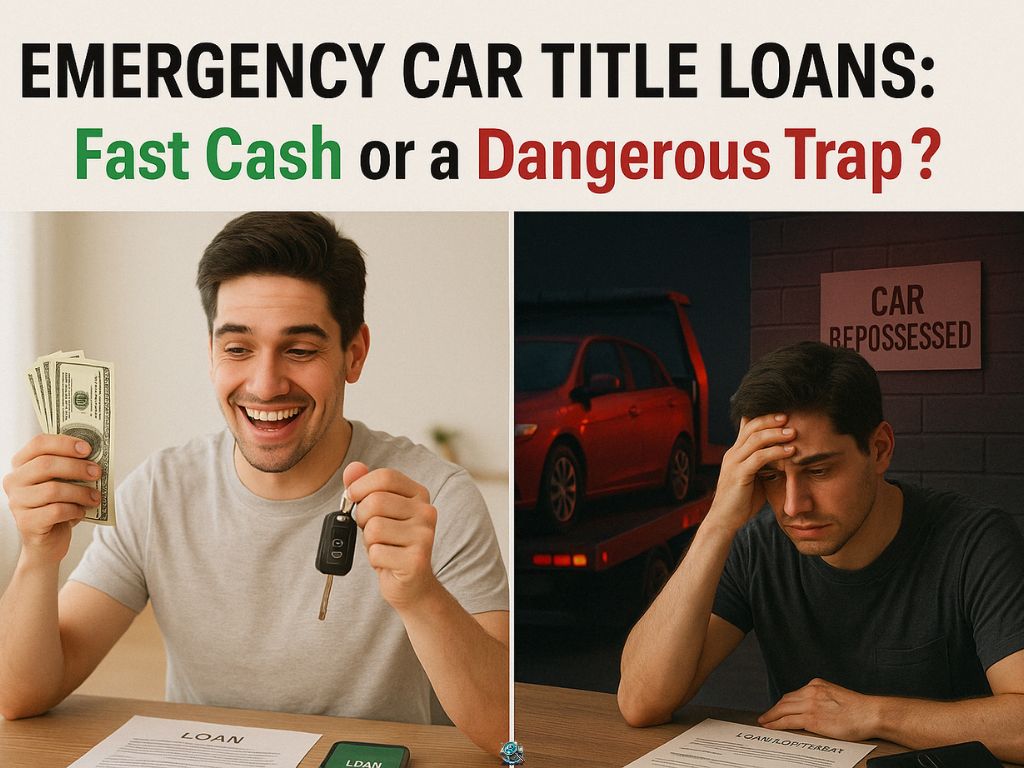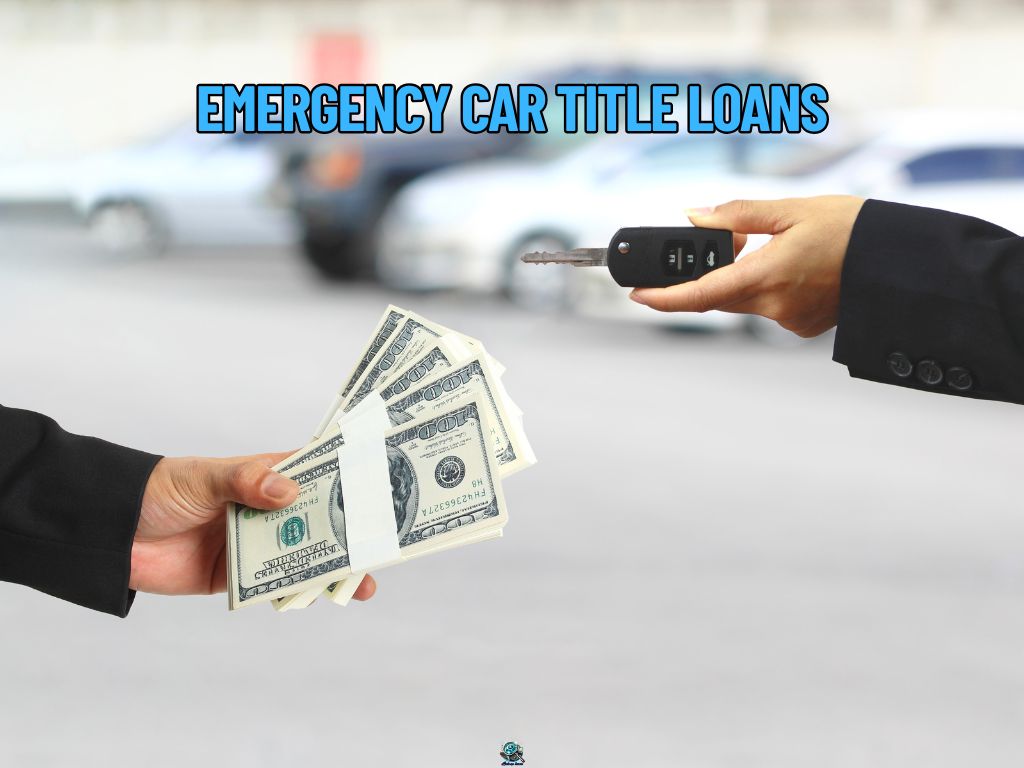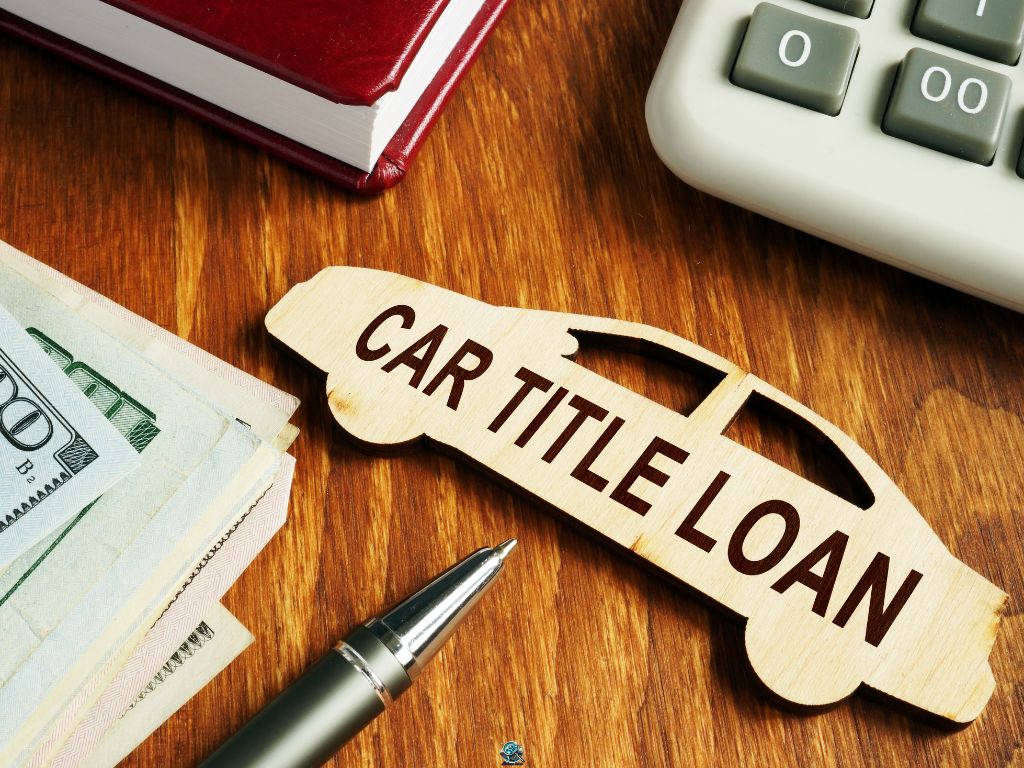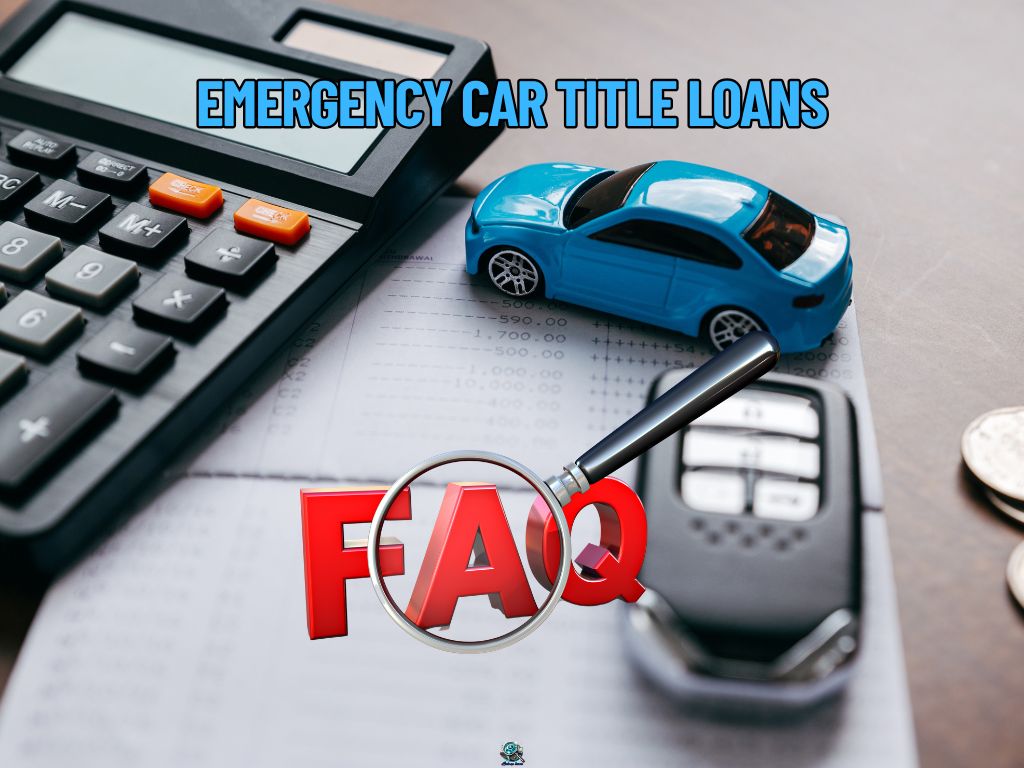Introduction
When life hits hard, rent’s overdue, utilities are past due, and your bank balance is barely breathing, logic takes a back seat. You’re not thinking about interest rates or loan terms. You’re thinking about survival.
That’s when the ads start following you: “Emergency car title loans! No credit check! Cash today!”
It sounds like relief. You still have your car, you need cash, and they’re promising a fix in 24 hours, no judgment, no red tape.
But here’s what those ads don’t tell you: speed comes at a cost, and the fine print always wins. Emergency car title loans are designed for one thing to move fast when you can’t afford to think slow.
They play on pressure, urgency, and fear and for thousands of borrowers each year, that moment of panic ends with a lost vehicle and even deeper debt.
In fact, according to the CFPB, nearly 1 in 5 title loan borrowers lose their car, and 4 out of 5 end up renewing the loan because they can’t afford to pay it back on time.
This guide is here to hit pause. To show you what these “instant” loans really cost, why they’re marketed the way they are, and which alternatives can get you cash fast without trading your car for a crisis.
By the end, you’ll know exactly how to spot a red flag lender, calculate the real cost of “fast money,” and find emergency options that protect your future, not drain it.
Key Takeaways
- Emergency car title loans are designed for speed, not safety. They offer quick cash using your vehicle as collateral, often within 24 hours.
- You don’t need good credit to qualify, but you do need to own your car outright and prove you can repay, fast.
- Interest rates are often predatory, with APRs reaching 200%–300% or higher. One missed payment can lead to instant repossession.
- These loans prey on panic. Many borrowers take them out under pressure and end up trapped in a cycle of rollovers, fees, and lost vehicles.
- There are safer ways to get emergency cash, even if your credit is bad including credit union PALs, local assistance programs, and secured personal loans.
Disclaimer: This site contains affiliate links. If you make a purchase, we may earn a commission at no extra cost to you.

What Is an Emergency Car Title Loan and Why It’s So Dangerous
An emergency car title loan is a short-term, high-cost loan that lets you borrow cash using your vehicle as collateral. You keep the car, but the lender keeps your title until you repay usually within 15 to 30 days.
On paper, it looks identical to a normal title loan. In practice, it’s built for panic.
Here’s the real difference: Emergency title loans are marketed to people in crisis, not to borrowers planning ahead.
They skip paperwork, skip credit checks, and skip transparency because they know you’ll skip questions when you’re desperate.
You’ve probably seen the ads:
- “Cash today, no credit check, no waiting!”
- “Instant approval! Keep your car, get your cash!”
- “Bad credit? No problem!”
Those aren’t financial promises, they’re psychological triggers.
They work because they speak to fear, not logic. Every part of the process from the bright colors on the website to the countdown timers in the ad copy is designed to create urgency.
And it works.
Borrowers under pressure rarely notice that the loan term is only 30 days, that interest rates can exceed 200%, or that one missed payment can lead to instant repossession.
According to the Consumer Financial Protection Bureau, more than 80% of title loan borrowers can’t repay on time and end up rolling over their loan, paying far more than they borrowed.
That’s not coincidence, that’s the business model.
So while a standard title loan is risky, an emergency title loan is uniquely predatory: it’s built to catch people when they’re most vulnerable and least able to compare options.
If you’ve never taken out a title loan before, pause here. You can read our complete guide to how title loans work first, it’ll help you see exactly what lenders don’t want you to understand.

The Emotional Trap: Why Urgency Makes Smart People Take Bad Loans
When bills pile up, food’s running low, and your phone won’t stop ringing, your brain doesn’t want logic, it wants relief.
That’s what emergency title lenders count on. They’re not selling loans; they’re selling escape buttons.
When you’re stressed or scared, your decision-making changes.
Psychologists call it “crisis cognition”, your focus narrows, your sense of risk fades, and you grab the fastest option in reach.
That’s why their ads sound like lifelines:
- “Instant approval no job required.”
- “Cash today, keep your car.”
- “No credit? No problem.”
Those phrases aren’t designed to inform you. They’re designed to disarm you.
- You stop asking what the loan really costs.
- You stop checking the fine print.
- You start convincing yourself that getting money today is the same as solving the problem.
And once you’ve signed, the math turns against you:
- You owe more than you borrowed.
- You have less time than you thought.
- And the lender profits most when you can’t pay it back right away.
Example: A borrower takes a $1,000 emergency title loan to cover rent. The term is 30 days, with a 25% monthly rate. They pay $250 in interest to roll it over, thinking they’re “buying time.” Three months later, they’ve paid $750 and still owe $1,000.
That’s not bad luck. That’s the business model.
According to Pew Research, over 80% of title loan borrowers renew their loan at least once, trapping them in long-term debt that started as a short-term fix.
Most borrowers don’t need more speed, they need one moment of pause. Because the only real way to escape an emergency is to make a decision your future self can live with.

What Really Happens After You Sign the Contract
The first 24 hours feel like relief. You filled out a quick form, uploaded your title, and the money hit your account faster than your bank app could refresh.
It feels like you found a way out. But what actually happened is that you entered a countdown clock most borrowers don’t even realize has started ticking.
⏳ The Repayment Window Is Brutally Short
Most emergency car title loans last 15 to 30 days. That’s not a payment schedule, that’s a full balance due date.
If you borrow $1,500, you could owe $1,875 or more in just a few weeks. Miss that deadline, and the lender doesn’t send a friendly reminder they send fees.
Here’s what usually happens next:
- Daily interest starts compounding. Every day you’re late costs more.
- Rollover “offers” appear. You pay another fee to push the due date out without reducing your balance.
- Total cost doubles or triples within weeks.
📉 Example: Borrow $1,000. Pay $250 to roll it over each month. After 3 months, you’ve paid $750 and you still owe $1,000.
That’s not relief. That’s designed dependency.
🚗 Repossession Can Be Instant and Silent
Buried in almost every title loan contract is a clause giving the lender the right to repossess your car the moment you default. No court order. No phone call. Just a tow truck and an empty driveway.
Many lenders even install GPS trackers or starter interrupt devices to make repossession fast and frictionless.
And when they sell your car at auction, you don’t automatically get the leftover balance.
In some states, they keep the full sale amount even if the car sold for more than your debt.
That means one missed payment could erase:
- Your transportation
- Your job access
- Your ability to earn the money to fix the problem
🧾 You Don’t Even Build Credit
Unlike personal loans or credit cards, most title lenders don’t report positive payments to credit bureaus. So even if you repay perfectly, you get no credit benefit.
But if you default and your account is sent to collections? That does get reported dragging your score down further.
It’s a one-sided system: all the risk is yours, all the reward is theirs.
⚠️ The Real Cost Isn’t Just Financial
When you lose your car, you don’t just lose an asset. You lose the ability to work, pick up your kids, get groceries, or even apply for better opportunities.
That’s why financial experts call title loans “crisis multipliers” ; they don’t just fail to solve your emergency, they often create new ones.
Bottom line: After you sign, the clock doesn’t count down to relief. It counts down to repossession — unless you have a clear, immediate, and realistic plan to repay in full.

Expert Warning: What the Data Says (and Lenders Don’t)
Here’s the truth most title lenders bury under their “fast approval” banners: the vast majority of borrowers don’t escape these loans they get trapped by them.
According to the Consumer Financial Protection Bureau (CFPB):
- 1 in 5 title loan borrowers loses their car to repossession.
- Over 80% of borrowers roll over their loans because they can’t afford to pay in full when it’s due.
That’s not a small oversight. That’s the business model.
Every rollover means more fees, more interest, and a longer leash for the lender until the borrower’s finances collapse or the car is gone.
Let’s put that into perspective: Imagine 10 people taking out an emergency car title loan today.
- 8 of them will still be paying the same loan months later.
- 2 of them will lose their car completely.
None of them will come out ahead financially.
For most borrowers, these loans don’t serve as a bridge. They serve as a trap door, one that opens fast and closes tight.
So before you hand over your keys, see how title loans stack up against safer emergency options that won’t cost your transportation or your peace of mind.

🚨 Emergency Title Loan vs Safer Alternatives
(Use this table as a quick visual to weigh the real trade-offs before committing.)
| Option | Collateral Needed? | Typical APR | Approval Speed | Risk Level | Key Benefit |
|---|---|---|---|---|---|
| Emergency Title Loan | Yes (your car) | 150% – 300%+ | Same day | 🔴 Very High | Fast cash, no credit check |
| Credit Union PAL | No | Up to 28% | 1–2 business days | 🟢 Low | Small loan, fair terms |
| Emergency Assistance Program | No | None | Varies | 🟢 Very Low | One-time help, no repayment |
| Cash Advance Apps | No | $0–$10 flat fee | Same day | 🟡 Medium | Fast, low-cost borrowing |
| Gig Work (Delivery, Tasks) | No | N/A (earnings-based) | Same day | 🟢 Low | Earn income instead of debt |
| Borrowing from Family | No | 0% (if agreed) | Immediate | 🟡 Medium (relational) | Interest-free support |
⚠️ Pro Tip:
If you’re searching for “emergency car title loans near me,” stop and compare costs side-by-side.
What looks like a quick fix could cost you your car — while safer options might take one extra day but save you thousands.

Safer Emergency Solutions You Can Use Right Now
When your budget’s collapsing and lenders are circling, it’s easy to believe that a car title loan is your only move. It’s not.
There are faster, safer, and smarter ways to get through a financial emergency even if your credit is rough and your checking account’s nearly empty.
Here are real-world options that won’t cost your car, your peace of mind, or your next paycheck.
💳 Credit Union Payday Alternative Loans (PALs)
Credit unions are some of the few lenders legally allowed to offer fair small-dollar loans, the kind designed to replace payday or title loans entirely.
Key Features:
- Loan amounts: $200 to $2,000
- APR capped at 28% (by law)
- Repayment terms: 1 to 12 months
- No credit check in most cases
Why it works: PALs are built for members who hit a short-term wall with transparent terms and affordable repayment plans.
First step: Visit MyCreditUnion.gov or call your local credit union. Membership usually costs under $10.
🏠 Emergency Rent, Utility, and Hardship Programs
Before selling your car to pay the bills, check if help is already available. Cities, nonprofits, and faith-based organizations run quiet aid programs that can cover critical expenses directly.
Common Assistance:
- Rent or eviction prevention
- Utility shutoff prevention
- Food, gas, and transit vouchers
- One-time hardship grants
First step: Dial 2-1-1 or visit your county assistance website. They can connect you to verified programs in minutes.
⚡ Cash Advance Apps (Use With Care)
If you’re employed or receive direct deposits, cash advance apps can tide you over until your next paycheck.
Popular options:
- Earnin – Borrow against hours you’ve already worked.
- Dave – Offers up to $500 advances.
- Brigit – Includes overdraft protection tools.
Why they work: No credit checks, no collateral, and low or no fees.
Use only for: One-time, short-term gaps not recurring expenses.
🚗 Gig Work for Same-Day Income
If your car’s your asset, use it, don't risk it. Same-day gig apps can turn wheels into income fast, often within hours.
Examples:
- Uber Eats / DoorDash – Food delivery on your schedule.
- Amazon Flex – Package deliveries with guaranteed pay.
- TaskRabbit / Instawork – Local, quick-turn jobs.
Why it works: You earn immediately without borrowing, no contracts, no repossession risk.
First step: Download a reputable gig app, set up direct deposit, and start earning today.
🤝 Borrowing from Family or Friends (Done Right)
It’s awkward, but it’s also human and often safer than any high-interest loan.
Why it works: You borrow interest-free and avoid damage to your credit or losing your car.
How to do it right:
- Put everything in writing amount, repayment, timeline.
- Treat it like a real loan.
- Stick to your word.
That structure turns an emotional ask into a responsible agreement.
💡 The Big Idea
Emergencies are temporary. The choices you make during them can last years. When everything feels urgent, speed feels like safety but it isn’t.
You can still get help fast without gambling your car, your credit, or your future. Take one extra hour to compare, call, or apply elsewhere. That’s the hour that changes everything.
Next Step: Learn how secured personal loans work, a safer middle ground that can still offer fast approval and manageable terms.

When (If Ever) It Makes Sense to Use a Title Loan
Most financial experts agree: a car title loan should be your absolute last resort.
But life isn’t theory sometimes, the math, timing, or desperation leaves you with few options.
If that’s you, don’t rush. Instead, use this decision filter to test whether a title loan makes strategic sense or just feels emotionally convenient.
1️⃣ You Fully Own Your Car Free and Clear
This is non-negotiable.
Your title must be in your name with no active liens or remaining payments.
If the lender has to fight for ownership or your car’s still financed, you’ll either be denied or charged even higher rates to offset the risk.
Why it matters: Full ownership means you’re borrowing against true equity. Without that, you’re paying sky-high rates on partial ownership and risking repossession for a car you don’t technically own yet.
2️⃣ You Have Steady, Verifiable Income
A title loan assumes you’ll have money to repay within 15–30 days.
If your income is unstable, seasonal, or pending, that timeline will crush you.
Why it matters: Consistent income is the only realistic path out of the loan. Without it, every “extension” offer is just another layer of debt.
If your paycheck or benefit payment is guaranteed and coming soon (like within a week), that’s the only scenario where short-term use might work.
3️⃣ You Need It for a Few Days Not Weeks or Months
Time is the interest multiplier.
Borrowing $1,000 for 7 days and repaying it fast might mean paying $50–$100 in fees still expensive, but survivable.
Carry that same loan for 3 months, and you’ll easily double or triple what you owe.
Why it matters: The longer the loan lives, the faster the costs snowball. Short use = damage control. Extended use = debt trap.
4️⃣ You’ve Tried Every Other Option First
Title loans only make sense if you’ve exhausted every safer, cheaper path including:
- Personal loans for bad credit
- Credit union PALs
- Employer cash advances
- Borrowing from trusted friends or relatives
- Emergency assistance programs
Why it matters: If a single alternative is still available, take it. A few days of delay or paperwork could save you from losing a $10,000 asset over a $1,000 loan.
5️⃣ You Understand Every Term and Fee No Exceptions
Before signing, confirm:
- Exact APR (annual, not monthly rate)
- Full repayment amount in dollars, not just percentages
- Penalties for being late or rolling over
- Repossession rights how soon and under what conditions
If the lender hesitates, downplays, or hides any of this, walk away.
Why it matters: Transparency is the only safeguard in a predatory system. If they can’t explain the math, they’re hiding the trap.
⚖️ The Final Filter
If you can confidently answer “yes” to all five of these and you’ve budgeted repayment in full within weeks then a car title loan might function as a temporary bridge, not a trap.
But if even one answer is “no,” you’re not buying time, you're buying a financial crisis on delay.
Clarity is your best protection. Desperation makes quick decisions feel safe; discipline makes smart ones possible.

Final Thoughts: You’re in a Tough Spot Don’t Make It Tougher
Emergencies don’t come politely. They crash through the door, the rent’s late, the lights are off, the account’s empty and suddenly, anything fast feels like a lifeline.
That’s exactly why car title loans exist: to sell speed when you need calm.
They promise relief in minutes. But what they really deliver is debt that multiplies overnight and takes your car with it.
So before you sign, stop for one breath one pause long enough to ask yourself three things:
- Can I repay this in full, and on time no matter what?
- Do I truly understand every fee, every rate, every risk?
- Am I solving today’s crisis or building tomorrow’s problem?
If any answer makes you hesitate, that hesitation is your warning light. It’s not weakness, it's awareness.
You’re not alone in this. Millions of Americans face the same pressure every year, and most never hear the full truth until it’s too late.
The difference between losing your car and keeping your stability often comes down to one moment of clarity, this one.
Take that pause. Compare alternatives. Reach out for real help, not quick cash.
Because a temporary setback doesn’t define your future. But the decision you make under pressure can reshape it.
Next Step: Protect your finances before the next emergency hits. Read our guide on how to build credit without credit cards practical, low-risk ways to strengthen your financial safety net.

Frequently Asked Questions (FAQ)
1. Can I get an emergency car title loan with no job?
You might, but lenders still need proof of income. This can include benefits, part-time work, or gig earnings. No income usually means higher risk and much higher rates.
2. How fast can I get money from a title loan?
Many lenders offer same-day cash, especially online, but most fund within 24 to 48 hours after approval and document verification.
3. What happens if I can’t repay on time?
You’ll face late fees, rollover charges, and possibly repossession. Most title lenders move quickly once you miss a payment, often without warning.
4. Can I get a title loan if I’m still paying off my car?
Usually no. Most lenders require you to own the car outright, though some allow smaller loans if your equity is high.
5. Do car title loans affect my credit?
Not usually for good. Most lenders don’t report on-time payments, but defaults or repossessions can appear on your credit report and hurt your score.
6. Are emergency title loans safer than payday loans?
No. Both are expensive and short-term, but title loans are riskier because your car can be repossessed if you default.
7. Can I refinance a title loan to avoid losing my car?
Sometimes, but refinancing often adds more fees and interest. It’s usually better to negotiate directly with the lender for a payment plan if you’re struggling.
8. What are safer alternatives to a title loan?
Consider a credit union Payday Alternative Loan (PAL), a small personal loan, or a cash advance app. Many nonprofits and local programs also offer one-time emergency assistance.
9. How can I avoid needing a title loan again?
Build a small emergency fund, improve your credit, and explore low-cost borrowing tools like secured credit cards or credit-builder loans.
0 Comments